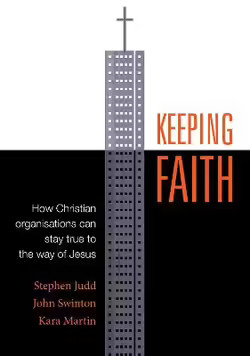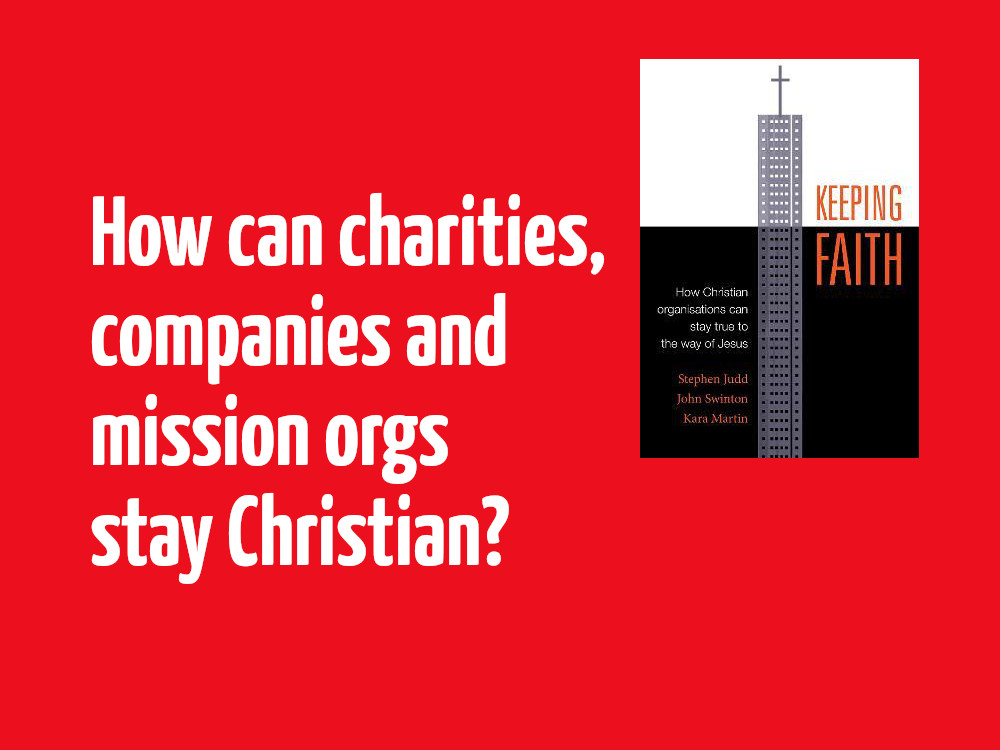How to keep Christian organisations Christian.
It’s a well-worn cliché that Christians create organisations, schools, charities and businesses that start out to be distinctively Christian but become something else.
Immediate examples come to mind such as The Benevolent Society, one of the earliest charities founded in Australia,”as the NSW Society for Promoting Christian Knowledge and Benevolence in these territories and the Neighbouring Islands”; the YMCA which even has Christian in its name. Another example in Keeping faith is more recent – The Ethics Centre, founded with the support of St James Kings Street that has cut its Christian connection.
So how do you keep a charity from becoming a generic welfare institution or a group meant to gather Christians still doing that?
Keeping Faith: How Christian Organisations can stay true to the way of Jesus gives an up-to-date answer. Written by people who have themselves been at the centre of the struggles it covers.
“We believe that the most important thing that God requires of Christian organisations is faithfulness to the Christian life: expressed in the Bible and modelled by Jesus.
” “This faithfulness is maintained by ensuring an overlap between the ethos (culture, spirit) of an organisation with its Christian identity and the impact that it has. It is a faithfulness that is informed by a deep and contextual Statement of Organisational theology.”
Let start with that intriguing word ethos which has turned up in religious freedom debates with the Albanese government promising that schools will have the right to maintain their ethos.
“The ethos is the characteristic spirit of an organisation that is manifested in its culture, relationships, values and attitudes and aspirations, the authors say.
At this point, some readers, particularly evangelical ones, want to reach for theology. But what is interesting about this book is that theology is dealt with towards the end.
The authors set about demonstrating how a theologically consistent org works first. Then how to make sure the proper theology is applied.
Because, as historian John Dickson helped them to recall, having correct theology has not prevented some horrendous acts. Martin Luther called for the burning of synagogues as an example he gave. Ravi Zacharias, who had an impeccable statement of faith, is a modern example.
So Keeping Faith sets out to show faith needs to permeate an organisation for it to keep the faith.
The book is full of powerful stories.
“The principal of one school told us how the mother of a young Aboriginal man, Jim (not his name), made an appointment to see him. She travelled from the country to the city and told of her concern for her boy and asked that he get the opportunity to attend the school. ‘It was,’ he said, ‘a true case of the importunate widow. There was no real choice to make.’
“But the principal observed the benefits were two-way. ‘9Jim) was a powerful Christian witness saved his holiday job money to assist children in India and visited them, organised his elders to make a gift of aboriginal tools and weapons to give to the school and was an outstanding sportsman. Other boys regarded him highly and the community of the school was the beneficiary of a wonderful five years.”
And here’s a story of a retirement village operator setting aside normal lump-sum entry contributions.”Grace.. had been a long-time missionary in Pakistan before she retired. She finally returned to Australia as poor as the preverbal church mouse. For the next 30 years she paid a small rent for her villa. She was a key member of the retirement village community, blessing others through her hospitality, love and service. Her personal contribution far outweighed any “entry contribution” that’s waived to enable her to join the community.”
These two stories are stories of hospitality, a key component of Christian Theology. Other stories cover the place of grace, looking after finances and risk-taking – especially in missionary organisations. These all need to be theologically worked through. A simple statement of faith is too thin; a values statement leaves Jesus out.
“We contend that the way to resolve this issue –the missing link_ is an articulated organisational Theology, which takes the knowledge of God and details how it applies in every activity of an organisation, be it a school, overseas aid agency, pension fund, health service or whatever, the authors argue.
They give three examples of how theology can be embedded into organisations.
- People management policies in many Christian organisations follow secular models. But repentance and forgiveness need to be there too. There are some remarkable stories about that in the book.
- An organisation’s leadership style will come from how grace is viewed. If common grace is the main concern, then the personal beliefs of those doing good are a lesser concern. But ion special grace is involved, then proclaiming Christ will be central.
- Church Missionary Society Australia sends people overseas, which will always involve risk. Their risk management policy theology is grounded in the sovereignty of God but also in the presence of risk in a broken world. It also acknowledges spiritual warfare. Yet “as God graciously gives us his word, his courage and his wisdom, he enables us through the peer of his Spirit to make wise choices that avoid on the one hand foolhardiness or recklessness, and on the other hand fear and anxiety.”
You can’t go and buy an organisational theology, the Keeping Faith authors insist. It can’t be borrowed.
It can’t be co-designed by seeking consensus within what might be a longish organisation. One od the authors, Stephen Judd, tells the story of executives wordsmithing a series of HammondCare statements“An executive unobtrusively replaced ‘Jesus’ with ‘God’ while the meeting was focussed on another part. It was only when the statements went to the board that the change was picked up.
The Apostle’s or Nicene creed are not enough – more is needed. “a school might reflect on their theology of knowledge and learning.; an entrepreneurial IT startup might focus on stewardship of how it relates to customers and investors; camping organisations might focus on the beauty of creation and our stewardship of it.”
It is a gift to take the time to think through why you do what you do, the Keeping Faith authors insist. Drifting away can Abe subtle and slow. Take the time to stay on track.

Keeping Faith: How Christian Organisations Can Stay True to the Way of Jesus Stephen Judd, John Swinton, Kara Martin, Acorn Press $24.99 Available from The Wandering Bookseller

